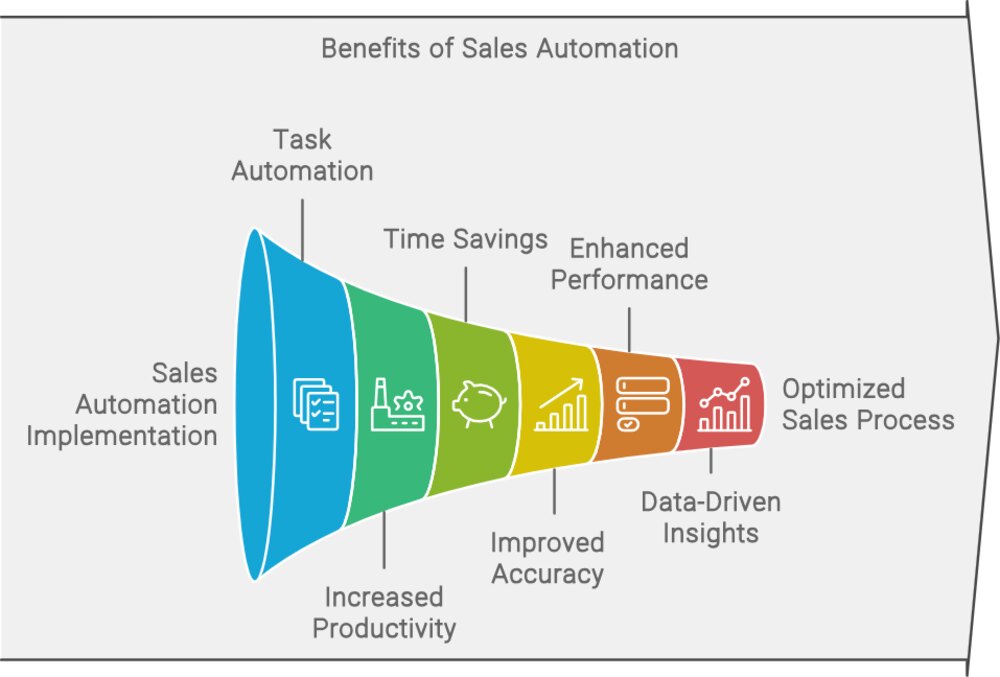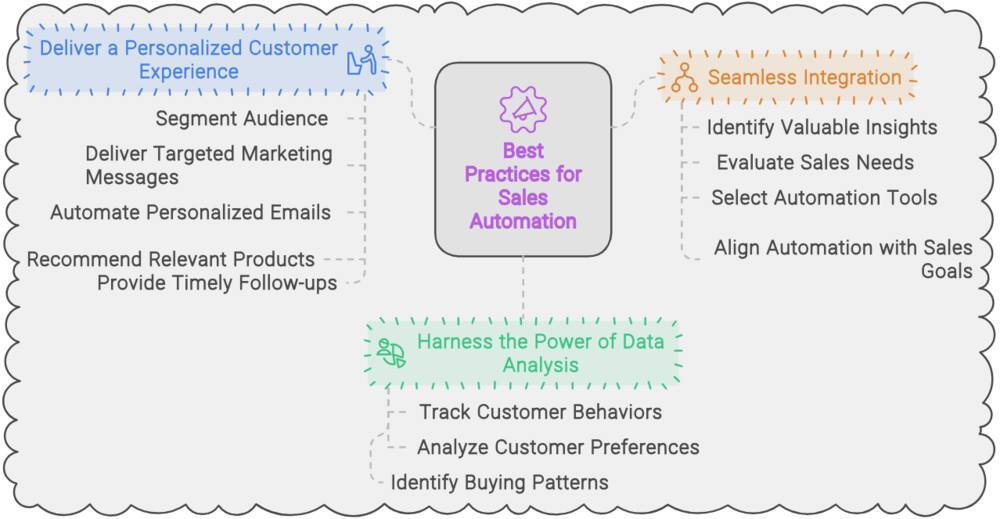How a Customer Engagement Platform Can Transform Your Marketing Strategy
See how a customer engagement platform can transform your marketing strategy with better personalization & interaction.

Discover how to master sales automation techniques and streamline your processes for unparalleled success. Explore expert strategies, tips, and best practices to revolutionize your sales approach and achieve optimal efficiency in your business endeavors.
When it comes to maximizing sales efficiency and driving growth, sales automation is a game-changer. By leveraging innovative technology and strategic processes, businesses can automate their sales processes, streamline operations, and ultimately, boost revenue.
Sales automation refers to the use of software and technology solutions to automate various stages of the sales process. From lead generation to customer relationship management, automation streamlines tasks, eliminates repetitive manual work, and optimizes business operations. By automating time-consuming tasks, sales teams can focus on engaging with prospects and driving revenue growth.
One of the key advantages of sales automation is its ability to automate the sales process from start to finish. From capturing and qualifying leads to nurturing prospects and closing deals, sales automation catalyzes enhanced productivity and improved sales performance.
Sales automation empowers businesses to automate various aspects of the sales process, allowing for greater efficiency and effectiveness. By utilizing automation tools and platforms, sales teams can automate lead capture, lead scoring, and lead nurturing processes. This ensures that valuable leads are not overlooked and are nurtured effectively until they are sales-ready.
Furthermore, sales automation enables businesses to automate communication with prospects and customers. Automated email campaigns, personalized follow-ups, and targeted messaging can be effortlessly executed, enhancing customer engagement and driving conversions.
Customer Relationship Management (CRM) software plays a pivotal role in implementing effective sales automation strategies. CRM systems serve as a centralized hub for managing customer data, tracking sales activities, and monitoring customer interactions. They provide sales teams with valuable insights, enabling them to make data-driven decisions and tailor their approach to individual customers.
By integrating CRM software with automation tools, businesses can synchronize their sales and marketing efforts, ensuring a seamless flow of information and efficient automation. With a comprehensive CRM system in place, businesses can automate lead management, track customer interactions, and analyze data to drive targeted sales strategies.
Understanding sales automation is crucial for businesses looking to optimize their sales processes and drive revenue. By automating repetitive tasks and leveraging CRM software, businesses can streamline operations and focus on building valuable customer relationships.
Sales automation can revolutionize the way you conduct business, offering a multitude of benefits that can drive your company’s success. By incorporating automation into your sales process, you can experience increased productivity, save valuable time, and elevate the overall performance of your sales team.
One of the primary benefits of sales automation is the significant boost in productivity it provides. By automating time-consuming tasks such as data entry, lead nurturing, and follow-ups, your sales representatives can focus their energy on what truly matters – building relationships with clients and closing deals.

With automation handling repetitive and manual tasks, your team can work more efficiently, allowing them to handle a higher volume of leads and prospects. Sales automation offers substantial time savings.
By eliminating manual processes and streamlining workflows, automation frees up valuable time for your sales team to engage in strategic activities that drive revenue. Instead of spending hours on administrative tasks, they can allot their time to cultivating relationships, conducting research, and developing targeted sales strategies.
Automating your sales process not only saves time and boosts productivity but also enhances the accuracy and consistency of your sales activities.
By eliminating human error and ensuring standardized processes, sales automation helps to mitigate mistakes, improve data quality, and provide a seamless experience for both your sales team and customers. With increased productivity and time savings, sales automation also improves the overall sales performance of your organization.
By implementing automated lead scoring and nurturing, you can identify the most promising leads and tailor your approach to meet their specific needs. This targeted strategy increases the likelihood of converting leads into valuable customers and accelerates the sales cycle.
Automation enables you to gain valuable insights into your sales activities. By tracking and analyzing data such as conversion rates, customer behavior, and sales team performance, you can make data-driven decisions that optimize your sales process and identify areas for improvement.
These insights empower you to refine your strategies, customize your messaging, and ultimately enhance your overall sales performance.
When it comes to implementing sales automation, having a well-defined strategy is key to achieving remarkable results. By optimizing your sales funnel and nurturing leads effectively, you can leverage automation tools to streamline your sales process and drive revenue growth.
One of the first steps in implementing sales automation is optimizing your sales funnel. This involves analyzing each stage of the funnel to identify areas for improvement and implementing targeted strategies to enhance efficiency and conversion rates.
Lead nurturing plays a crucial role in the sales automation journey. By providing valuable content, personalized messaging, and timely follow-ups, you can build trust, establish credibility, and guide leads through the buying process.
Automation tools are the backbone of a successful sales automation strategy. They empower your team to work more efficiently, improve productivity, and deliver a seamless experience to your customers.
“Implementing sales automation allows organizations to streamline their processes, reduce manual work, and focus on high-value activities. By leveraging automation tools effectively, businesses can achieve significant time and cost savings while delivering a personalized customer experience.”
– SalesTech Inc.
When choosing automation tools, consider your specific business needs and goals. Look for software and platforms that integrate smoothly with your existing systems, offer robust reporting and analytics capabilities, and provide scalability as your business grows.
When it comes to sales automation, adopting best practices can make a world of difference in maximizing its potential. By following these guidelines, you can ensure a personalized customer experience, leverage the power of data analysis, and seamlessly integrate automation into your sales process.

Personalization is key to modern sales strategies. Use sales automation to create tailored experiences that resonate with your customers. Leverage customer data to segment your audience and deliver targeted marketing messages. Automate personalized emails, recommend relevant products, and provide timely follow-ups to enhance customer satisfaction and drive conversions.
Data analysis is a crucial component of successful sales automation. By tracking and analyzing customer behaviors, preferences, and buying patterns, you can identify valuable insights that guide your sales strategies.
Implementing sales automation requires seamless integration into your existing sales process. To achieve this, start by identifying the pain points and bottlenecks in your current workflow. Evaluate your automation needs and select the right tools or CRM software that aligns with your goals.
Sales automation revolutionizes the way businesses operate, providing a powerful tool to streamline operations and drive sales growth. By embracing the concepts of sales automation and implementing effective strategies, businesses can unlock the full potential of this technology.
With sales automation, businesses can optimize their processes, improve efficiency, and save valuable time. By automating routine tasks and leveraging customer relationship management (CRM) software, businesses can focus on building meaningful relationships with customers and nurturing leads. This personalized approach leads to increased productivity and enables businesses to deliver exceptional customer experiences.
By harnessing the power of data, businesses can identify trends, refine their sales strategies, and maximize their results. Sales automation empowers businesses to adapt to changing market conditions and stay ahead of the competition.